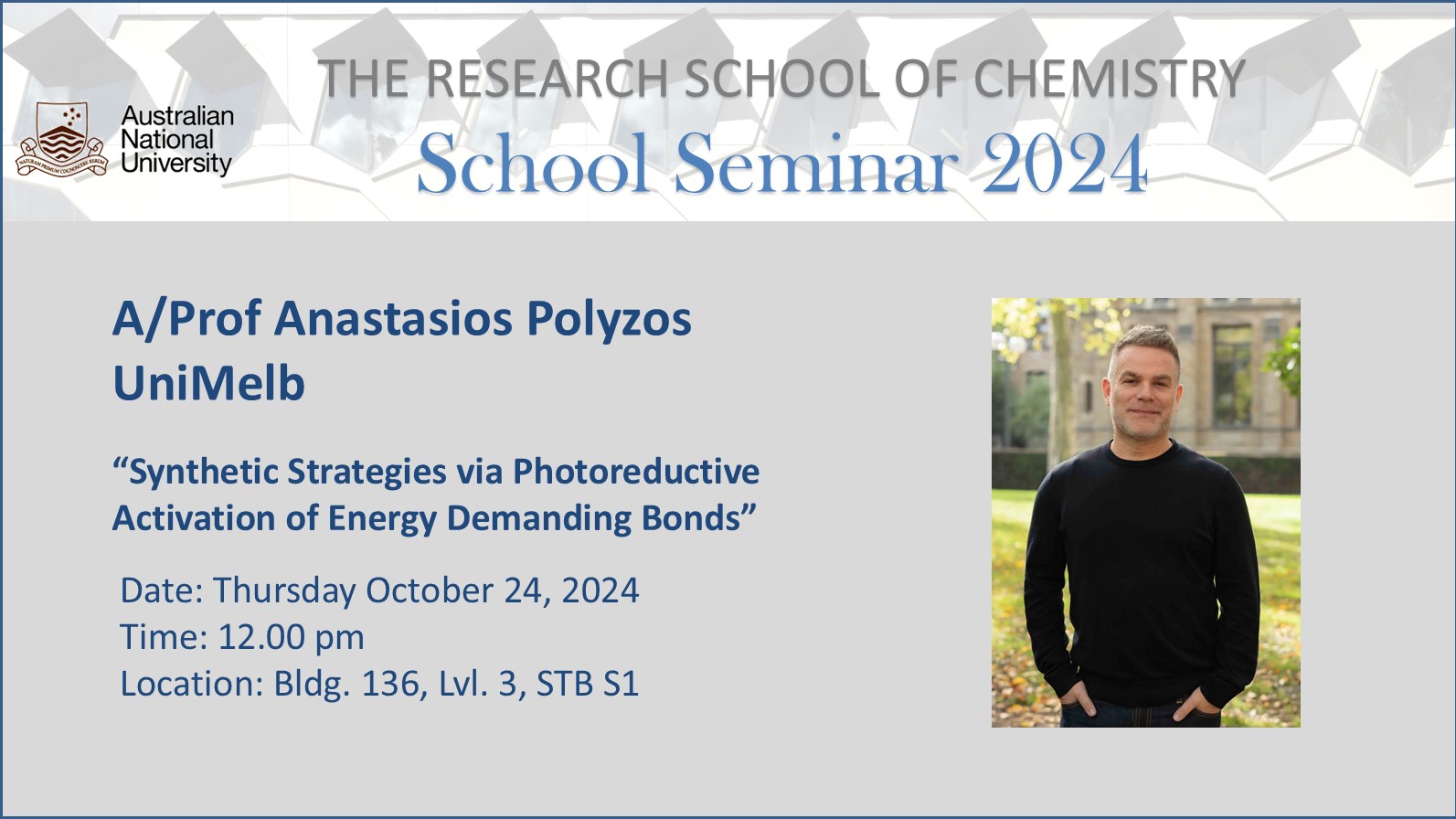RSC School Seminar - A/Prof Anastasios Polyzos
Title: Synthetic strategies via photoreductive activation of energy demanding bonds
Speakers
Event series
Content navigation
Description

Synthetic strategies via photoreductive activation of energy demanding bonds
Abstract
The reductive activation of organic molecules through single electron transfer (SET) is routinely deployed in diverse synthetic settings. Conventional single-electron reductants, such as samarium diiodide (SmI2) or dissolving metals, are predominantly deployed (super)stoichiometrically. Within the context of catalytic approaches enabling the controlled one-electron reduction of common functional groups or inert bonds, photoredox catalysis provides an intuitive strategy to generate potent SET reductants that can activate challenging substrates. Thus far, photoredox methods remain scarce due to the highly negative reduction potentials of many organic substrates (< -2.0 V) which fall beyond the scope of conventional photoredox catalysts. Multiphoton excitation catalysis is an emerging strategy to overcome the thermodynamic limitations of visible light photoredox catalysis. Our group recently disclosed a method for the in-situ generation of a high energy photoreductant from the readily available iridium photocatalyst via a two-photon tandem photoredox cycle1 and more recently, with cyanoarene donor-acceptor organophotocatalysis.2 This approach has successfully engaged unactivated organohalides and olefins for new C-C3 coupling reactions, showcasing the ability of common photoredox catalysts to yield potent excited-state electron donors via multiphoton excitation. The discovery and application of these catalytic reductive protocols to strategic reaction development, and target synthesis will be discussed.

1. J. Am. Chem. Soc. (2019), 141, 17646-17658.
2. ChemRxiv (2023), DOI: 10.26434/chemrxiv-2023-qrkjs
3. (i) Angew. Chem. Int. Ed. (2020), 132, 2-11; (ii) ACS Catalysis (2022), 12, 10018-10027; (iii) ACS Catal. (2021) 9, 5472–5480
Biography
Dr Anastasios (Tash) Polyzos is a Senior Lecturer and ARC Future Fellow at the University of Melbourne. Tash completed his doctoral studies in 2005 at La Trobe University and appointed to Research Fellow at the Australian National research agency, CSIRO in the same year. In 2008 he pursued post-doctoral research at University of Cambridge under guidance of Professor Steven V. Ley FRS. In 2011 he returned to Australia and lead the flow chemistry and catalysis group at CSIRO in Australia. He then embarked on an independent career in 2015 when he was appointed to the University of Melbourne.
His group’s accomplishments have been recognised by several achievements including the 2021 Grimwade Prize for Industrial Chemistry, Max O’Conner Award and Lectureship (2018), La Trobe University (2018) the Thieme Chemistry Journals Award (2017), Visiting Professorship, ETH Zurich (Swiss Federal Institute of Technology) (2016) and the Julius Career Award, CSIRO, Australia (2013).
Tash’s research interests include the development of new methods and enabling technologies for organic synthesis, photocatalysis, C-H reaction discovery, and the development of sustainable industrial process chemistry. He currently serves as Director of the Australian Research Council Industrial Transformation Training Centre for Chemical Industries, and founder of start-up company FlowAI.
Location
Building 136, Lvl 3, STB S1
